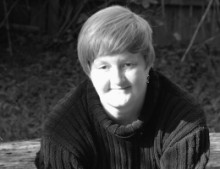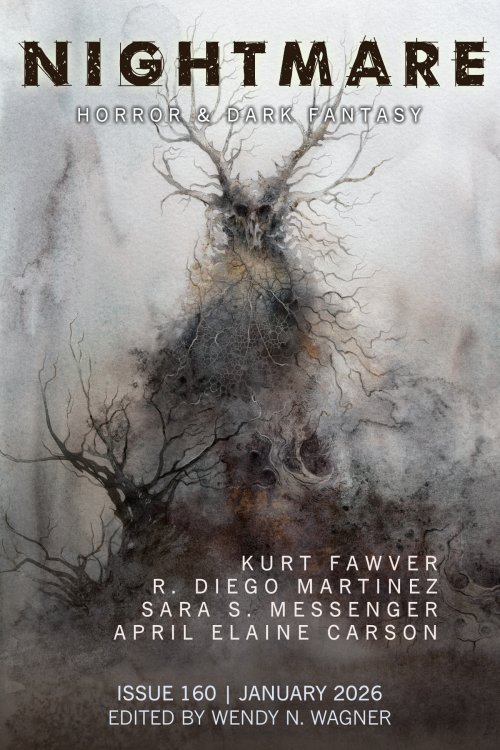Horror can be an intimate affair, a moment, a line given context, something that draws us out of our own reality and into a story where the unknown may well be the greatest fear of all. For me it was: “Their averted gaze hits even harder.” Short, sweet, to the point, sharp as a razor’s kiss. As a writer, what do you find in horror that makes it so acceptable to shy away from “the other”? Why do we delight in it so?
I think there’s a part of human nature that instinctively fears what they don’t know or understand. For me that aversion to “the other” is what draws me to horror because I’ve always identified more with the other, the monster, the incomprehensible. Often, I feel like an outsider even in my own sense of self, and so writing is a way for me to get closer to my thoughts and feelings. And then a big part of the appeal of horror is that first it introduces the other, the unknown, and then it entices you to come closer and closer. You want to figure it out, you want to go into the shadow despite all the warnings not to.
What sparked this exploration of death after death?
Ooh, great question. I wrote this story a long time ago, back in 2018, one day when I was thinking about society’s obsession with posthumous legacies. There was this Bible verse I’d learned in Sunday School: “Except a corn of wheat fall into the ground and die, it abideth alone/but if it die, it bringeth forth much fruit.” I remembered how much religious people loved that verse, they’d quote it to me like some wonderful mantra that assigned beauty and meaning to death. And I wanted to write a story that took that sentiment around legacy in the opposite direction, but I also wanted it to be a very grounded, very intimate story.
The interesting thing is when I shared it in my writing workshop, lots of people said they didn’t like the ending. It was too depressing, it ruined the idea of “like father like daughter,” it should have been more hopeful, et cetera. I even got feedback like that from one journal that rejected this piece.
Is this a story of “like father like daughter”? Is there something about the relationship between child and parent that lends itself to the horror genre?
For sure, but it’s also a story about disenfranchised grief. Kaitlyn is essentially ostracized; she can’t publicly mourn her father or even have a funeral; she can’t tell most people about this major loss in her life. So all those complex, heavy emotions just build and build inside her and lead to desperation. And you see her almost asking the question, how do I feel close to someone that I remember most clearly by their violence? Anyone who loses a parent wants to recreate a tangible, tactile connection with the person who’s passed. That’s really Kaitlyn’s driving motivation.
The narrative voice is a distant whisper falling short of warmth and lingering in the shadows of dissociation. Why did you choose this particular voice for the story?
This particular voice just kinda happened, right from the first draft. And it immediately felt right. It’s very detached and almost clinical sometimes, but I think that gives a more ominous effect than if I used a very present, passionate voice. It’s like a slow burn, the gradual realization of what you thought was static in the background is actually the sound of screaming.
In his own way, Rupert very much reminded me of Arthur Dimmesdale, the minister in The Scarlet Letter. He is both present as a complete character and as a prop Kaitlyn uses to support her crumbling illusions. Do you ever think of what happens when that support gives way?
Yep. Rupert serves a very specific purpose for Kaitlyn, and you see how dissatisfied she becomes when he isn’t functioning the way she wants him to. She’s looking at him like you’d stare at something you ordered online and being like “no, actually this isn’t going to work with my living room.” And I look around and see this kind of thing happening all the time in real life, this way of consciously or subconsciously using someone else to complete your life or identity. Having a child to repair a struggling marriage, for example. It doesn’t ever turn out well. People aren’t Band-Aids.
You know your way around the horror genre. Do you have other dark squiggly bits to share in 2023?
I do! I have a poem coming out in March with table//FEAST, I won their Rise and Shine poetry contest last year, and it’s a morbid little tale (and also serial killer-esque, coincidentally!) Then I have a sci-fi story “Embryo” that’s going to be out in the summer issue of Mythaxis. It isn’t horror, per se, but there’s definitely a scene in there that’s going to make you squirm. And again, it is someone doing something horrific to fill a sense of loss pervading their lives (I have a type, as you can see). I also have a story coming out with The Magazine of Fantasy & Science Fiction, I’m not sure of the release timetable yet, it’s called “No Other Gods Before Me.” It’s more psychologically dark and also slightly erotic. Darkly erotic.








